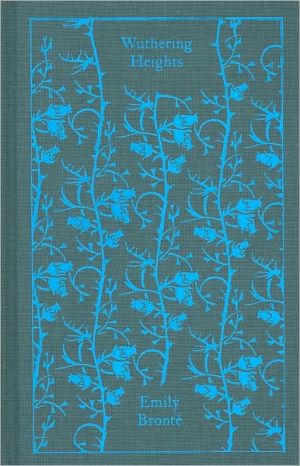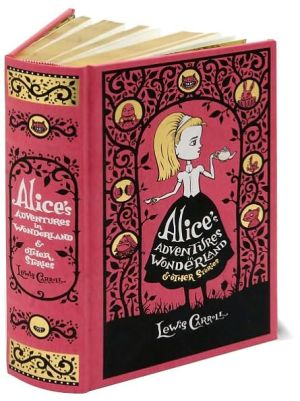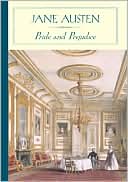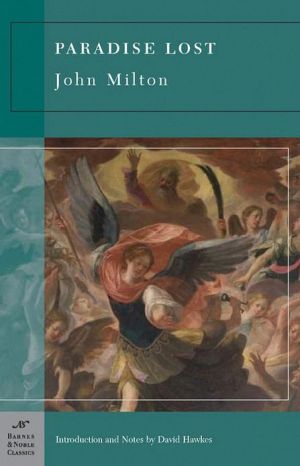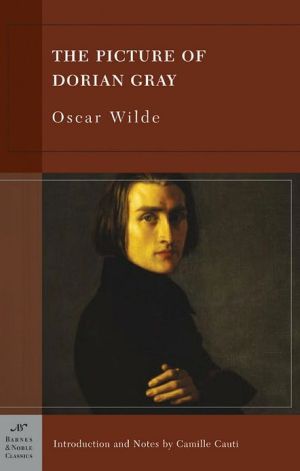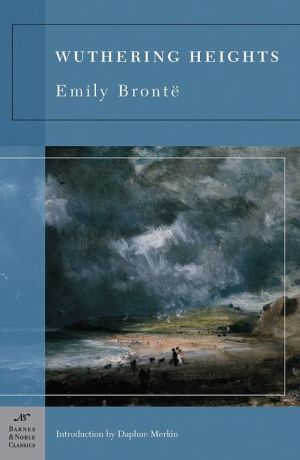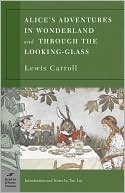Wuthering Heights
Wuthering Heights, Emily Bronte's only novel, is one of the pinnacles of 19th century English literature. It's the story of Heathcliff, an orphan who falls inlove with a girl above his class, loses her, and devotes the rest of his life to wreaking revenge on her family.\ \ In early nineteenth-century Yorkshire, the passionate attachment between a headstrong young girl and a foundling boy brought up by her father causes disaster for them and many others, even in the...
Search in google:
From Longman's Cultural Editions series, Wuthering Heights, edited by Alison Booth, presents Emily Bronte’s haunting, brilliant novel freshly edited, smartly annotated, and illuminated by various contexts. This illustrated edition is unique in locating Wuthering Heights in its region as well as period, while it follows every phase of the Brontë renown, from tourism to adaptations, from early reviews to recent critical trends.Children's LiteratureMore twisted and thorny that the branches of a wild rose, Heathcliff's dark, passionate obsessions consume him—and everyone who crosses his path. Considered one of the greatest works of English literature ever written, this gothic novel's bleak, destructive love story set against the desolate backdrop of England's Yorkshire moors has, for over 150 years, ensnared readers with its complexities, unreliable narrators and characters nearly beyond belief in their harshness. This affordable edition in the Puffin Classics line includes many helpful features that make the story more easily understood by modern readers, including a family tree, an annotated "Who's Who" to distinguish each character's role, an author profile, and two introductions. The first introduction is by S. E. Hinton, author of The Outsiders, and the second is by Charlotte Bronte, who edited the 1850 edition. Astute teachers will capitalize on the glimpse of the time period provided by a "Biographical Notice of Ellis and Acton Bell," which, though slightly confusing, ultimately reveals that all of the Brontes works were originally published under the gender-neutral pseudonyms Acton, Ellis, and Currer Bell. In this notice, penned after the death of her author-sisters Anne & Emily, Charlotte clears what was apparently a great mystery at the time: that Anne was Acton, Emily was Ellis, and she was Currer. This could be used as a springboard into discussions of social customs of the time and how they impacted both the author's life and the novel she wrote. This edition also includes some thought questions and suggested activities based on the novel. Best of all, however, is the book's design. It fits perfectly in one's hands and has easy-to-read type. Reviewer: Keri Collins Lewis
1801\ \ I have just returned from a visit to my landlord--the solitary neighbour that I shall be troubled with. This is certainly a beautiful country! In all England I do not believe that I could have fixed on a situation so completely removed from the stir of society. A perfect misanthropist's heaven; and Mr. Heathcliff and I are such a suitable pair to divide the desolation between us. A capital fellow! He little imagined how my heart warmed towards him when I beheld his black eyes withdraw so suspiciously under their brows, as I rode up, and when his fingers sheltered themselves, with a jealous resolution, still further in his waistcoat, as I announced my name.\ \ "Mr. Heathcliff?" I said.\ \ A nod was the answer.\ \ "Mr. Lockwood, your new tenant, sir. I do myself the honour of calling as soon as possible after my arrival, to express the hope that I have not inconvenienced you by my perseverance in soliciting the occupation of Thrushcross Grange: I heard yesterday you had had some thoughts--"\ \ "Thrushcross Grange is my own, sir," he interrupted, wincing. "I should not allow any one to inconvenience me, if I could hinder it--walk in!"\ \ The "walk in" was uttered with closed teeth, and expressed the sentiment, "Go to the deuce": even the gate over which he leant manifested no sympathizing movement to the words; and I think that circumstance determined me to accept the invitation: I felt interested in a man who seemed more exaggeratedly reserved than myself.\ \ When he saw my horse's breast fairly pushing the barrier, he did put out his hand to unchain it, and then sullenly preceded me up the causeway, calling, as we entered thecourt--"Joseph, take Mr. Lockwood's horse; and bring up some wine."\ \ "Here we have the whole establishment of domestics, I suppose," was the reflection suggested by this compound order. "No wonder the grass grows up between the flags, and cattle are the only hedge-cutters."\ \ Joseph was an elderly, nay, an old man: very old, perhaps, though hale and sinewy. "The Lord help us!" he soliloquised in an undertone of peevish displeasure, while relieving me of my horse: looking, meantime, in my face so sourly that I charitably conjectured he must have need of divine aid to digest his dinner, and his pious ejaculation had no reference to my unexpected advent.\ \ Wuthering Heights is the name of Mr. Heathcliff's dwelling. "Wuthering" being a significant provincial adjective, descriptive of the atmospheric tumult to which its station is exposed in stormy weather. Pure, bracing ventilation they must have up there at all times, indeed: one may guess the power of the north wind blowing over the edge, by the excessive slant of a few stunted firs at the end of the house; and by a range of gaunt thorns all stretching their limbs one way, as if craving alms of the sun. Happily the architect had foresight to build it strong: the narrow windows are deeply set in the wall, and the corners defended with large jutting stones.\ \ Before passing the threshold, I paused to admire a quantity of grotesque carving lavished over the front, and especially about the principal door; above which, among a wilderness of crumbling griffins and shameless little boys, I detected the date "1500," and the name "Hareton Earnshaw." I would have made a few comments, and requested a short history of the place from the surly owner; but his attitude at the door appeared to demand my speedy entrance, or complete departure, and I had no desire to aggravate his impatience previous to inspecting the penetralium.\ \ One step brought us into the family sitting-room, without any introductory lobby or passage. They call it here "the house" pre-eminently. It includes kitchen and parlour, generally; but I believe at Wuthering Heights the kitchen is forced to retreat altogether into another quarter: at least I distinguished a chatter of tongues, and a clatter of culinary utensils, deep within; and I observed no signs of roasting, boiling, or baking, about the huge fireplace; nor any glitter of copper saucepans and tin cullenders on the walls. One end, indeed, reflected splendidly both light and heat from ranks of immense pewter dishes, interspersed with silver jugs and tankards, towering row after row, on a vast oak dresser, to the very roof. The latter had never been underdrawn: its entire anatomy lay bare to an inquiring eye, except where a frame of wood laden with oatcakes and clusters of legs of beef, mutton, and ham concealed it. Above the chimney were sundry villainous old guns and a couple of horse-pistols: and, by way of ornament, three gaudily painted canisters disposed along its ledge. The floor was of smooth, white stone; the chairs, high-backed, primitive structures, painted green: one or two heavy black ones lurking in the shade. In an arch under the dresser reposed a huge liver-coloured bitch pointer, surrounded by a swarm of squealing puppies; and other dogs haunted other recesses.\ \ The apartment and furniture would have been nothing extraordinary as belonging to a homely, northern farmer, with a stubborn countenance and stalwart limbs set out to advantage in knee-breeches and gaiters. Such an individual seated in his armchair, his mug of ale frothing on the round table before him, is to be seen in any circuit of five or six miles among these hills, if you go at the right time after dinner. But Mr. Heathcliff forms a singular contrast to his abode and style of living. He is a dark-skinned gipsy in aspect, in dress and manners a gentleman: that is, as much a gentleman as many a country squire: rather slovenly, perhaps, yet not looking amiss with his negligence, because he has an erect and handsome figure; and rather morose. Possibly, some people might suspect him of a degree of underbred pride; I have a sympathetic chord within that tells me it is nothing of the sort: I know, by instinct, his reserve springs from an aversion to showy displays of feeling--to manifestations of mutual kindliness. He'll love and hate equally under cover, and esteem it a species of impertinence to be loved or hated again. No, I'm running on too fast: I bestow my own attributes over liberally on him. Mr. Heathcliff may have entirely dissimilar reasons for keeping his hand out of the way when he meets a would-be acquaintance, to those which actuate me. Let me hope my constitution is almost peculiar: my dear mother used to say I should never have a comfortable home; and only last summer I proved myself perfectly unworthy of one.
About the seriesAbout this volumePt. 1Wuthering heights : the complete text in cultural contextIntroduction : biographical and historical contexts3The complete text (1847)15Cultural documents and illustrations289The regional context: Haworth, Yorkshire, and the Moors292The political context : the women's movement295The historical context : the Irish potato famine302Imperial and racial contexts : models for Heathcliff316The legal context : English inheritance laws324Pt. 2Wuthering Heights : a case study in contemporary criticismA critical history of Wuthering Heights333Psychoanalytic criticism and Wuthering Heights348What is psychoanalytic criticism?348Psychoanalytic criticism : a selected bibliography359The absent mother in Wuthering Heights364Marxist criticism and Wuthering Heights379What is Marxist criticism?379Marxist criticism : a selected bibliography391Myths of power : a Marxist study on Wuthering Heights394Cultural criticism and Wuthering Heights411What is cultural criticism?411Cultural criticism : a selected bibliography424Imperialist nostalgia and Wuthering Heights430Feminist criticism and Wuthering Heights451What is feminist criticism?451Feminist criticism : a selected bibliography459Changing the names : the two Catherines468Combining perspectives on Wuthering Heights478From "your father was emperor of China, and your mother an Indian queen" : reverse imperialism in Wuthering Heights480Glossary of critical and theoretical terms503About the contributors530
\ Children's Literature - Kristina Cassidy\ One of the greatest gothic romance novels of all time, Wuthering Heights is the story of a tortured and ultimately tragic romance between Catherine Earnshaw and Heathcliff. The story is told in a series of flashbacks. Heathcliff is an orphan brought to Wuthering Heights by the kindly Mr. Earnshaw. Heathcliff's best friend as he grows up is Mr. Earnshaw's daughter, Catherine. Earnshaw's son, Hindley, hates Heathcliff and forces Heathcliff to work as a hired hand after his father's death. Catherine and Heathcliff fall in love, considering themselves two parts of one person, but Catherine chooses to marry a neighbor, Edgar Linton. Heathcliff is devastated at Catherine's betrayal and leaves. When he returns months later, he is wealthy and marries Edgar Linton's sister, Isabella. Heathcliff and Catherine fight bitterly over this development, but reconcile shortly before she dies in childbirth. Heathcliff spirals into madness, taking out his fury on the Earnshaws and Lintons, punishing even his and Catherine's children. This new edition of the classic novel includes a cover illustration and extra features designed to capitalize on the popularity of Stephenie Meyer's Twilight gothic romance series. The cover even proclaims Wuthering Heights "Bella and Edward's favorite book." The extras include a quiz, information about the traits of gothic romance, and trivia about Emily Bronte, as well as Facebook profiles and quizzes for Heathcliff and Catherine. Other classics given a similar treatment include Romeo and Juliet and Pride and Prejudice. Reviewer: Kristina Cassidy\ \ \ \ \ School Library JournalGr 7 Up\ This audio version of Emily Bronte's classic is narrated by Ann Flosnik. Initially, her narration makes it difficult to distinguish between characters, but as the tale progresses, her vocal characterizations become more dramatic and unique for each character, drawing listeners deeper and deeper into this dark and brooding love story. The first disk of the set also contains a PDF ebook of the full text of the novel which can be downloaded. Some students will want to read along with the narrated version, while others can use the ebook as a reference tool for class assignments. A nice addition to classic literature collections and a good way to enhance the English curriculum.-Anita Lawson, Otsego High School, Otsego, MI\ \ \ \ Internet Book WatchThis abridged presentation of a classic brings to life Bronte's gothic romance and provides a powerful reading by Martin Shaw, whose voice perfectly captures this dark story of the moors. Those reluctant to read the full classic will find this audio version compelling and hard to quit listening to.\ —Internet Book Watch\ \ \ \ \ From Barnes & NobleAn intriguing tale of revenge in which the main characters are controlled by consuming passions. This novel was once considered such a risk by its publishers that Emily Bronte had to defray the cost of publication until a sufficient number of copies had been sold.\ \
